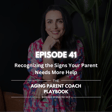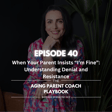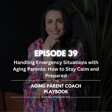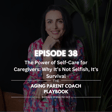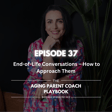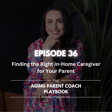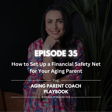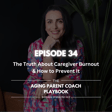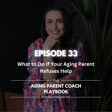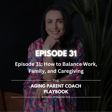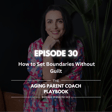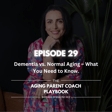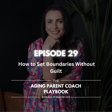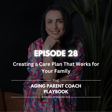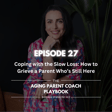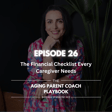Become a Creator today!Start creating today - Share your story with the world!
Start for free
00:00:00
00:00:01

Episode 16: Finding Connection: Avoidant Attachment and Caring for Aging Parents
If caregiving feels suffocating or you find yourself focusing on tasks over emotional connection, you might lean toward avoidant attachment. In this episode, Dr. Barbara Sparacino explores the avoidant caregiving experience, shares James’s journey toward meaningful connection, and provides small, actionable steps to balance independence with emotional closeness.Keywords:
Avoidant attachment, caregiving independence, emotional connection, aging parents, caregiving challenges, family relationships, practical caregiving strategies.Call to Action:
“Looking for more ways to navigate caregiving with confidence? Subscribe to The Aging Parent Playbook or visit TheAgingParentCoach.com for personalized support.”
Transcript
Impact of Avoidant Attachment on Caregiving
00:00:39
Speaker
Welcome back to the Aging Parent Playbook. I'm your host, Dr. Barbara Spericino, and today we're focusing on avoidant attachment and how it impacts caregiving. If you've ever felt uncomfortable with emotional close closeness or like caregiving demands feel suffocating, you might lean toward an avoided attachment tile. But here's the good news. Avoidant attachment also brings strengths like independence and practicality, which are valuable in caregiving.
00:01:09
Speaker
Let's explore how to navigate caregiving as an avoidantly attached person, focusing on building connection while protecting your emotional energy.
Origins of Avoidant Attachment
00:01:22
Speaker
So what is avoided attachment? Avoided attachment often develops in childhood when caregivers were emotionally distant or encouraged independence at the expense of emotional needs.
00:01:38
Speaker
As it the adults, avoidantly attached individuals tend to prioritize self-reliance and may struggle with emotional vulnerability. About 25% of adults fall into the avoidant attachment category, often prioritizing self-reliance over emotional connection.
Caregiving Challenges for Avoidant Individuals
00:01:58
Speaker
In caregiving, this might look like avoiding difficult conversations with your parent Focusing on practical tasks rather than emotional connection. Feeling uncomfortable with your parents increasing dependence on you.
Advantages and Disadvantages of Avoidant Attachment
00:02:20
Speaker
So how does avoidant attachment impact caregiving? Avoidant attachment isn't a bad thing. It can actually be helpful in caregiving. Your ability to stay practical and level-headed is a huge asset.
00:02:34
Speaker
But like everything, it can also create challenges, especially when emotional connection is needed.
Case Study: James and Emotional Connection
00:02:42
Speaker
Let me tell you about James, one of my clients. He struggled with caregiving for his mom after she was diagnosed with Alzheimer's disease. He avoided visiting her often because of her increasing dependence made him feel overwhelmed and uncomfortable. Through coaching, James learned to start small. He'd bring her favorite dessert and sit with her for just 15 minutes. Over time, those short visits became meaningful, helping him feel more connected without losing sense of independence.
Strategies for Avoidant Caregivers
00:03:25
Speaker
So what are some practical tips for avoidantly attached caregivers? Here are some strategies to balance emotional distance and caregiving demands. First, start small. Focus on small gestures of connection like asking about their day or sharing a memory. Structure your time. Plan caregiving tasks to reduce the feeling of being overwhelmed. Use your strengths. Lean into your practicality by managing finances, medical appointments, or other logistical tasks.
00:04:02
Speaker
Avoidant attachment doesn't have to hold you back in caregiving. With small intentional steps, you can balance emotional connection and independence. Remember, even small moments of connection can make a big difference.
Conclusion and Resources
00:04:15
Speaker
If you found this episode helpful, please subscribe and share it with someone who might benefit. For personalized support, check out my coaching programs at theagingparentcoach.com. And as always, take care and remember, you've got this.

